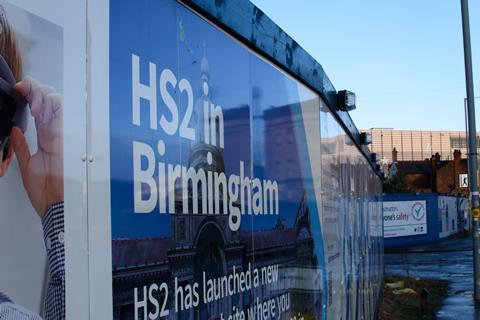HS2 and DfT ‘underestimated complexity and risk’ of project
The cost of the main civil engineering works on the first phase of HS2 has increased by 85%, or almost £5bn, the National Audit Office has revealed.
The public spending watchdog said that costs for the 140-mile section of the route between London and Birmingham had risen from £5.8bn in April 2017 to £10.7bn by October 2019.

In its report, High Speed Two: A Progress Update, the NAO said: “The High Speed Two railway is over budget and behind schedule because the Department for Transport (DfT), HS2 and wider government have underestimated its complexity and risk.”
The report found that the cost of designing and building stations at Euston and Old Oak Common in London and Interchange and Curzon Street in the Midlands had gone up by 34%, or £1bn, to almost £4bn in the same period.
>> Analysis: What else is blocking HS2?
>> Also read: Dozens of Tory MPs demand HS2 goes ahead
Explaining the increase, the NAO said: “Additional costs of constructing bridges, tunnels and earthworks as the consequences of the DfT’s set requirements for HS2 became clear in the programme’s design. Contractors’ security, design and logistical costs were higher than anticipated.”
It said that station costs had also gone up as estimates of contractor overheads and design costs were based on programmes which underestimated the costs of HS2 as well as additional requirements from the DfT and third parties on the specification of the stations.
The NAO said: “Significant challenges to completing the programme and delivering value for money for the taxpayer remain.”
The report also revealed the extent of delays to individual projects within the scheme, such as the appointment of contractors to build Curzon Street and Interchange stations.
HS2 scrapped the process to find a contractor to build the £435m Curzon Street station last July and now looks unlikely to name a builder until next year. It had been due to do this in 2020.
The appointment of a contractor for Interchange has also been pushed back from this year.
When HS2 cancelled the Curzon Street procurement process it said it was doing so as it had “recognised the current market conditions are challenging and the increasing concern regarding risk transfer and have therefore revised our position to provide a better balance and overall outcome”.
Now the NAO has revealed details of HS2’s new approach to risk. It said contractors had previously been contractually obliged to cover 60% of any cost increases above a target price, but HS2 has now changed this.
“To incentivise contractors to deliver, HS2 will agree performance indicators, including on cost and schedule,” the watchdog said.
“If contractors do not meet the required performance, they will lose a proportion of their fee. HS2 has provided contractors with the potential to claw back lost fee payments if they can demonstrate improved performance.”
Contractors will also earn a proportion of whatever contingency funds remain at the end of the contract.
HS2 reacts
“The vast majority of the NAO’s findings were revealed in HS2 Ltd’s 2019 stocktake – a year’s worth of deep dive investigation into the underlying costs and timescale of the project. As such, the revised costings and schedule are already widely known.
“After being appointed HS2 Ltd chief executive in 2017, Mark Thurston identified the serious challenges of complexity and risk in the project, and he made several significant changes and improvements to the organisation, its governance and processes.
“As the NAO recognises, this work - along with a greater understanding of the ground conditions and build requirements - means ministers have robust cost estimates for phase 1 of the HS2 project.
“If the government decides to proceed, HS2 Ltd has a highly-skilled team in place ready to build Britain’s new state-of-the-art, low-carbon railway.”


























1 Readers' comment